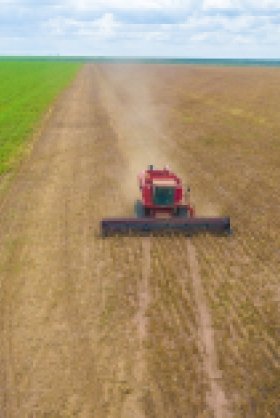Uncovering the Deforestation and Climate Risks of Chinese and EU Soy and Beef Imports from South America





To examine the role of the international community in shaping Latin America’s environmental agenda, the Wilson Center’s Latin American Program and its Brazil Institute, the Environmental Change and Security Program, China Environment Forum, and Global Europe Program launched a collaborative research project in 2020, Latin America’s Environmental Policies in Global Perspective.
The latest paper in this series explores the role of agricultural commodities in South America and their influence on accelerating deforestation. The author is André Vasconcelos, a senior associate at Global Canopy and Trase, an organization tracking issues of supply chain sustainability. Vasconcelos examines the environmental impacts of soy and beef production in Uncovering the Deforestation and Climate Risks of Chinese and EU Soy and Beef Imports. He argues that current efforts to address deforestation are focused largely on the Amazon region while ignoring other important, highly diverse biomes. He argues that shifting targets to combat deforestation to “specific production regions" offers a "strategic opportunity" for Chinese and European buyers to address the environmental impacts of large-scale beef and soy production.
Author


Latin America Program
The Wilson Center’s prestigious Latin America Program provides non-partisan expertise to a broad community of decision makers in the United States and Latin America on critical policy issues facing the Hemisphere. The Program provides insightful and actionable research for policymakers, private sector leaders, journalists, and public intellectuals in the United States and Latin America. To bridge the gap between scholarship and policy action, it fosters new inquiry, sponsors high-level public and private meetings among multiple stakeholders, and explores policy options to improve outcomes for citizens throughout the Americas. Drawing on the Wilson Center’s strength as the nation’s key non-partisan policy forum, the Program serves as a trusted source of analysis and a vital point of contact between the worlds of scholarship and action. Read more


China Environment Forum
China’s global footprint isn’t just an economic one, it’s an environmental one. From BRI investments in Africa and Asia to its growing presence in Latin America, understanding China’s motivations, who stands to gain - and who stands to lose - is critical to informing smart US foreign policy. Read more


Environmental Change and Security Program
The Environmental Change and Security Program (ECSP) explores the connections between environmental change, health, and population dynamics and their links to conflict, human insecurity, and foreign policy. Read more


Brazil Institute
The Brazil Institute—the only country-specific policy institution focused on Brazil in Washington—aims to deepen understanding of Brazil’s complex landscape and strengthen relations between Brazilian and US institutions across all sectors. Read more




